Journey through a sea of possibilities
After "Chorlabor", which brought together amateur choirs with contemporary composers Matthias Heep, Leo Dick and Sylwia Zytynska, Basel's Gare du Nord launched a follow-up project. Finally, in mid-May, three choirs presented their improvised pieces of music.
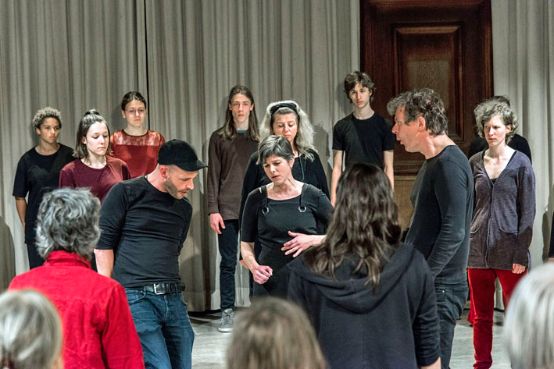
Can an amateur choir create an entire concert evening from "nothing"? The Basel choirs have taken up this challenge Culture and people and bâlcanto and the Youth choir ATempo! of the Basel music school improvising. The result of the long and sometimes arduous "journey" was an hour-long performance: it was touching and funny, but sometimes also left the audience somewhat perplexed.
According to the concept of project manager Johanna Schweizer, the three choirs received a "free pass" from the Gare du Nord and the Kunstmuseum Basel to perform in the exhibition. Basel Short Stories. From Erasmus to Iris von Roten to gather inspiration for a work to be developed. Three new pieces of music have been created in various stages, known as "looping journeys", since April 2018. This process required a great deal of courage, for example when swimming in the Rhine. Sännelä hojahoo had to sing.
The choir members were supported on these adventures by three cracks from the improvising music scene, vocal performers Christian Zehnder and Andreas Schaerer and singer Isa Wiss, who guided the choir members through an almost endless sea of sounds and creative possibilities. "For many of the participants, the improvisational freedom was a great challenge, in which some of them felt lost, especially at the beginning," explained Schweizer.
In addition, the choirs were to find a way to record the newly developed music on paper - an approach to graphic notation. The result turned out differently, however, as the evening was guided by video sequences by Paula Reissig, which calmly and cleverly set the beat and content - improvisation and structure were intended to complement each other, especially as there were no texts, which made it somewhat difficult for the audience to understand.
Rotating movements on the ice
The themes chosen reflected the character of each choir in a striking way, allowing them to bring their strengths to the performance. The evening began with the Kultur und Volk choir, which performed to the movie Frick and tails improvised on the Basel ice skating duo Werner Groebli and Hansruedi Mauch. Fittingly, Christian Zehnder, who specializes in new alpine music, acted as coach.
-
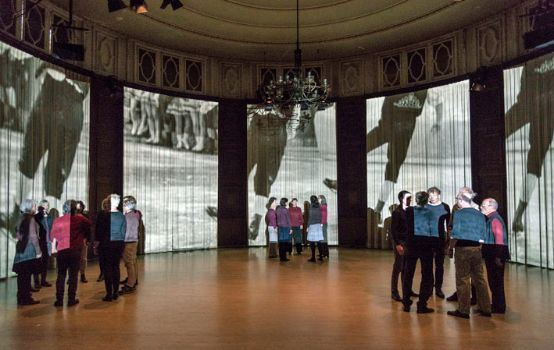
- Photo: Ute Schendel
- Choir Culture and People with Christian Zehnder
Reissig's video showed less the capers of the figure skating heroes than the audience cheering them on. Coherent, revolving, sometimes somewhat lengthy sequences, which the choir accompanied with playful movements and sound fragments: Divided into three groups, they clapped, murmured and "sang" in rhythm. It was a sequence initiated by images that culminated in a yodelling song, the "Zuger".
Improvising into delirium
The choice of the youth choir ATempo!, which, under the direction of Andreas Schaerer, explored the inventor of LSD, Albert Hofmann, proved somewhat more difficult. Lying vocal lines based on minimal music accompanied and accompanied video recordings showing abstract frequency curves or laboratory views with a spinning metal barrel. So there was little development, lengths were actually pre-programmed.
-
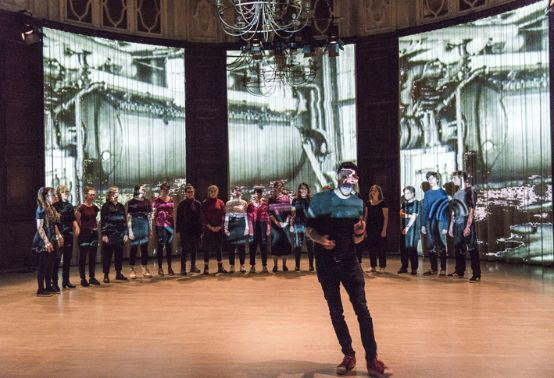
- Photo: Ute Schendel
- Andreas Schaerer and the youth choir ATempo! of the Basel Music School
To get in the mood for their project, the young people researched traffic noises on Wettsteinplatz or improvised to "intoxication and delirium" at Badischer Bahnhof. As a result, two young choristers said that they would now sing more courageously, "no matter what the others think". Together, the choir succeeded in setting the inner processes in motion, for example by passing each other crosswise with rising and falling vocal curves, with dissonances and consonances.
Voice collage as a search for peace
Under the direction of Isa Wiss, bâlcanto, an international choir, took the audience into a completely different world. It chose the civil-religious aspect of the 1912 Basel Peace Congress, an abstract theme for which photos were available, but no "moving images". Nevertheless, the performance became a successful "demonstration" thanks to a choreographed sequence of movements and the new video sequences.
-
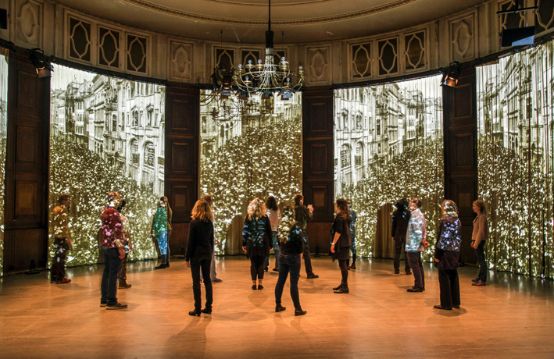
- Photo: Ute Schendel
- bâlcanto
Out of nowhere, the actors trudged onto the podium, began to mumble quietly and then louder and louder, scraps of words such as "justice" or "people" whizzed through the air and in the hullabaloo, a woman began to croak loudly. A touching chorale developed in between. The piece ended with a bell improvisation, to which all the participants gradually took to the stage.
This was followed by a final improvisation, during which one slightly missed the video recordings that provided the framework. For the participants, however, this ending was probably particularly important, as one choir singer put it: "The coming together of the choirs! What an inter-generational project!"
Link to the project website
Efrat Alony is Best Foreign Artist
Efrat Alony was awarded Best Foreign Artist at the Artemis Women in Action Film Festival 2019 in Los Angeles for her song "Hear Me" from the album "Dismantling Dreams". Alony is a lecturer at the Bern University of the Arts.
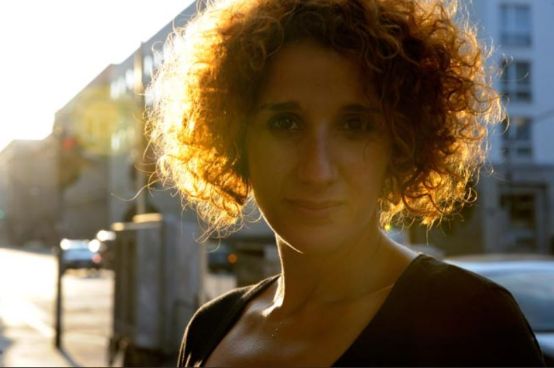
Alony was born in Haifa as the daughter of Iraqi immigrants and grew up in Israel. There she began her studies in composition and singing, which she later continued in the USA at the Berklee College of Music in Boston and completed in Berlin at the Hanns Eisler Academy of Music.
As a feature vocalist and composer, Efrat Alony has performed with the Sunday Night Orchestra, the Ed Partyka Jazz Orchestra, the Jazz Orchestra Concertgebouw, Amsterdam and the Bigband of the Hessischer Rundfunk. Efrat Alony teaches singing and ensembles at the HKB.
The Artemis Women in Action Film Festival celebrates "women who create cultural change and inspire others".
Music and words poetically united
The initiator of the Bruges Rhone Festival, soprano Franziska Heinzen, has invited Rachel Harnisch, among others, and is focusing on the 200th anniversary of Clara Schumann's birth.

A Lied recital is more than just a concert, because it combines music and words in the most poetic way: Festival initiator and soprano Franziska Heinzen has set herself the goal of promoting art song in her home town of Brig through various concert formats. After a successful first edition in May 2018, with Swiss baritone Äneas Humm and Hartmut Höll, piano, among others, the Rhone Festival for Lied Art will take place for the second time from 30 May to 2 June.
It will open with an unconventional evening in the bistro of the Zeughaus Kultur Brig: poetry slam (Phibi Reichling, Kilian Ziegler and Felicia Brembeck aka Fee) meets the supposedly "iron" art of song. This concept by pianist Marlene Heiss won the Audience Engagement Award 2018 at the Graz song competition "Schubert und die Moderne".
The highlight of the festival is the recital by the internationally renowned soprano Rachel Harnisch, also from Brig, and her piano partner Jan Philip Schulze, with works ranging from Franz Schubert to George Crumb.
To mark the 200th anniversary of the birth of pianist and composer Clara Schumann, the festival will focus on compositions by women: The recital "Female composers: Adornment or Master?" with Franziska Heinzen, soprano and Benjamin Mead, piano, highlights works by 20 female composers from Clara Schumann to Isabel Mundry. In addition, Barbara Terpoorten will read about the lives of Clara Schumann, Alma Mahler and Fanny Hensel-Mendelssohn. The focus will continue in the Capitol cinema with the award-winning documentary film Composers by Kyra Steckeweh and Tim van Beveren, which goes beyond the sheet music to illuminate the composer's not always easy position over the last 200 years.
As a Swiss festival, the Rhone Festival would like to promote Swiss composers and poets - most of whom are unknown - with its own concert in future. As more Swissness is not possible than on Swiss National Day, this concert will take place outside the regular festival period around August 1st, this year under the title "Alte Weisen, neu entdeckt: Homage to Gottfried Keller" on July 31 at Stockalper Castle in Brig.
Further information on all events can be found at
Winterthur supports Esse-Musicbar
At the end of August 2019, the "Esse-Musicbar" property on Rudolfstrasse in Winterthur will be demolished. The Esse Winterthur jazz club will now operate its concert venue in Zeughaus 1. To finance the conversion and expansion, the city is providing a site contribution of CHF 80,000 and an interest-free loan of CHF 100,000.
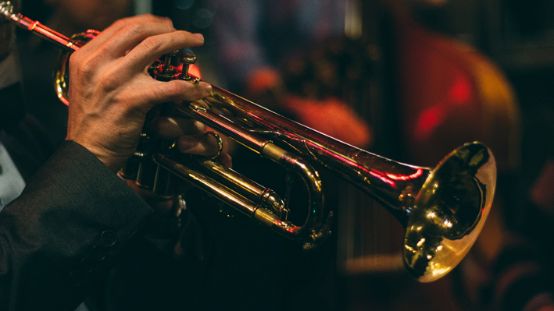
The Esse Winterthur jazz club has been running a jazz bar at Winterthur train station since 2005. Due to the change of use by SBB, the Esse-Musicbar property will be demolished at the end of August 2019. The cultural association wants to maintain its musical offering and has found a new location for its concert venue in Zeughaus 1 at Zeughausstrasse 52.
Since 2017, the operation of the Esse-Musicbar has been supported by the city of Winterthur with an annual subsidy of CHF 25,000. To finance the investments in the conversion and expansion of the new location, the association acquires funds from foundations and private individuals and applies to the lottery fund of the Canton of Zurich for a contribution. However, a condition for a contribution from the lottery fund is a commitment from the local municipality. The city of Winterthur therefore makes a location contribution of CHF 80,000 and also grants the association an interest-free loan of CHF 100,000.
With up to 170 concerts and events a year, the Esse-Musicbar makes an important contribution to Winterthur's attractiveness as a city of music. In 2008, the concert venue was awarded the Winterthur Cultural Foundation's Culture Prize. With the location contribution and the loan, the city of Winterthur is supporting the Esse Winterthur jazz club in its project and enabling the concert venue to reopen from September 2019.
Basel-Landschaft honors Mischa Cheung
The canton of Basel-Landschaft honors the pianist Mischa Cheung with a 20,000 Swiss franc culture prize, the artist Kitty Schaertlin is also honored with a category prize and the FahrAwaY circus spectacle with the Nouveau Cirque sponsorship prize. An anniversary prize goes to the choir directors of the Liestal and Muttenz grammar schools.
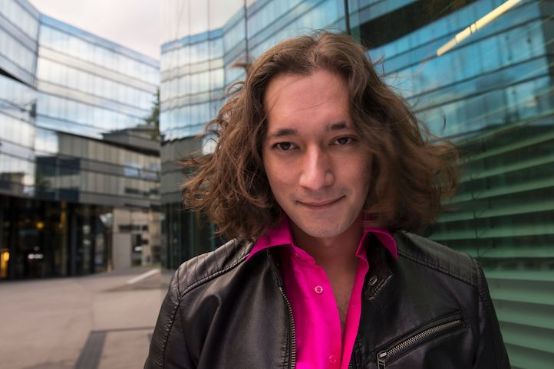
Mischa Cheung studied piano with Konstantin Scherbakov at the Zurich University of the Arts. He is a member of the Gershwin Piano Quartet, which performs works for four concert grand pianos, and was pianist with the classical band Spark from 2011 to 2015. Since 2014 he has performed as a soloist at the Symphonic Game Music Concerts of Merregnon Studios. Since 2009, he has been an assistant to Konstantin Scherbakov's master class and a lecturer in piano and improvisation at the Zurich University of the Arts.
According to the canton, the choir directors Lucia Germann and Michael Zumbrunn (Gymnasium Liestal) and Christoph Huldi, Jürg Siegrist and Christine Boog (Gymnasium Muttenz) have been responsible for "high-quality and successful choir projects for decades with great personal commitment". The last highlight for the time being was the oratorio concert "Elijah" by Mendelssohn with the choirs from Muttenz and Liestal and the Basel Symphony Orchestra at the Musical Theater Basel in October 2018. The 50th anniversary prize for the Baselland Culture Awards 1969-2019 is endowed with CHF 25,000. The prize money is earmarked for further projects with secondary school choirs from the canton.
Relaxed sovereignty
For the 51st time, the Wittener Tage für Neue Kammermusik will offer insights into contemporary composition. Barblina Meierhans from Burgau will be taking part.

With a "small pinch of humor", Meierhans looks at a special culture: in addition to football, bowling is very important in the Ruhr region. Once the work is done, people meet up, drink beer and schnapps, talk - and in between they throw balls at skittles. The pub with bowling alleys on Ruhrstrasse in Witten looks long since abandoned. Plaster is peeling from the walls, the furniture is worn, muted colors are reminiscent of the 1950s. Meierhans wanted to refer to the location "without nostalgia", to take a friendly look at the absurdities of "club activities". Born in Burgau/SG in 1981, she positioned a percussionist near the former beer bar. A viola, a trombone and a saxophone play directly at the lanes; the sound ambience is supported by voice recordings via loudspeakers.
Meierhans rightly did not compose stringent works. Rather, they are loosened tone or sound sequences or something like small rhythm studies that can be heard. This leaves room for intellectual and athletic freedom. In between, festival-goers can throw a ball themselves, reflect on times gone by, abandon themselves to atmospheres that ultimately seem pretty, but ultimately also too timid and reserved. Well then: It may be due to different mentalities. Here the pithy, mostly male-dominated Westphalian bowling, there a reflective but also reserved female artist from Switzerland - it's not an easy constellation.
Playing with inside and outside
Barblina Meierhans' station Those days are over ... is not the only one. Alternative venues away from the concert halls have become a tradition in Witten. Sometimes - just like at the Rümlingen Festival - it's a sound hike in the countryside, sometimes pieces are performed on a ferry or in a streetcar, sometimes festival director Harry Vogt orders sound installations for cellar vaults. When it comes to site-specific art, composer and multimedia specialist Manos Tsangaris is the right address. Tsangaris' tried and tested recipe is to play with the inside and outside. This year in Witten it looks like this: Inside, in a kiosk from the 1950s with glass almost all around, the audience is seated, with sound provided by a few instrumentalists and loudspeakers. Outside, near a crossroads, ordinary passers-by move about alongside obscure figures who may be real or - who knows? - ordered by Tsangaris. He describes his station as a "chamber play", which could also be called "audio cinema".
In any case, a speaker and an interviewer come from the sphere of art, whose words reach the packed kiosk by radio. Tsangaris has fine antennae. As with Meierhans, the music should not be too much in the foreground. So it is rather small atmospheric additions that the musicians play. Meanwhile, the speaker strolling outside muses on the subject of progress, while the interviewer rather intrusively asks passers-by in Witten about their taste in music. Rolling Stones are a "force", says one passer-by. He doesn't know Karlheinz Stockhausen.
A concert like a rush
What happens inside the concert halls probably remains hidden from the people of Witten. What a pity! Because everything that sounds this year is worth listening to, some of it sensationally good. The concert with works by Mikel Urquiza, Sasha J. Blondeau and Sara Glojnarić, all around the age of thirty, was outstanding. Urquiza sets Danish texts by Inger Christensen to music, involving the soprano in enchantingly intimate dialogs with either a muted trumpet, clarinet or percussion. Sasha J. Blondeau, born in Briançon, France in 1986, opts for a grainy, roughened sound study, while Croatian composer Glojnarić's approach is more rhythmic in nature. In a witty manner, she does not refer to the "might" Rolling Stones, but to drum intros by rock groups The Police, Nirvana and U2. The fact that this 50-minute concert works so well is partly due to the entertaining heterogeneity and striking compositional quality of the works, but also to the performers. Sarah Maria Sun (soprano), Marco Blaauw (trumpets), Carl Rosman (clarinets) and Dirk Rothbrust (percussion) play breathtakingly. Terms such as "variability", "perfection" or "sound sensitivity" hardly do justice to the incredible musicality of this quartet.
The Witten Festival for New Chamber Music is clearly on the right track. After years of tense, sophistical complexity and an obsessive search for new worlds of sound, there seems to be more looseness in play again - no mere unfocused laissez faire, but a pleasingly skillful sovereignty. Three days full of lasting experiences. What more could you want?
Native replacement for tropical woods
Engineers at Dresden Technical University (TU) have developed a process for guitar manufacturer Hanika that makes spruce, maple or cherry usable for the construction of guitars. The domestic woods thus have at least the same acoustic properties as tropical wood.
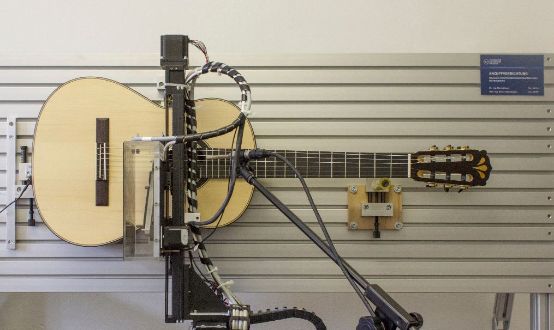
Until now, classical guitars have been made from a combination of long-stored tropical wood species such as West Indian cedar for the neck, East Indian rosewood for the sides and back and ebony for the fingerboard. Since the beginning of 2017, however, stricter regulations have applied to the trade in endangered woods from the tropics, meaning that musical instrument makers have to rely on alternatives.
With the TU Dresden treatment process, native woods are thermally treated at a certain temperature and pressure for a certain period of time in order to accelerate the necessary ageing processes of the wood. As a result, the thermally modified native woods can be further processed into high-quality musical instruments after just one year.
Hanika now produces four new, completely tropical wood-free guitar models (basic, middle, upper and master class) from thermally treated local woods. The guitar manufacturer was awarded the title of "ZIM Craft Project of the Year" at the Innovation Day for SMEs organized by the Federal Ministry for Economic Affairs and Energy (BMWi) in Berlin.
Thurgau honors Jossi Wieler
This year's Culture Prize of the Canton of Thurgau goes to the theater and opera director Jossi Wieler. With the prize, which is endowed with CHF 20,000, the cantonal government is honoring the work of the prizewinner, who comes from Thurgau.
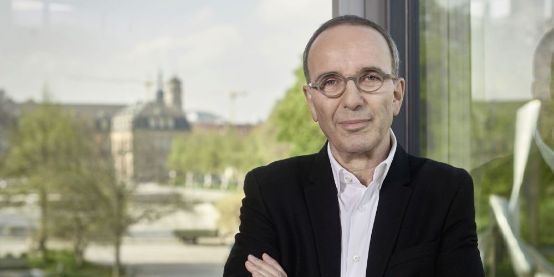
Jossi Wieler grew up in Kreuzlingen in 1951. He lived in Thurgau until 1972 and then moved to Tel Aviv, Israel, to study directing. He then gained his first stage experience at the Habimah National Theater and, from 1980, at the Düsseldorfer Schauspielhaus. He then worked as an actor-director in Heidelberg, Bonn, Stuttgart, Hamburg, Munich and Berlin. From 1988 to 1993 he was resident director at the Theater Basel. He then worked as a freelance director, including at the Münchner Kammerspiele and repeatedly at the Salzburg Festival.
Since 1994, he has also directed operas together with Sergio Morabito. Wieler and Morabito were voted Directing Team of the Year in 2002 and 2012 and received the German Theater Prize Der Faust in the category "Best Opera Direction" in 2006 ("Doktor Faust") and 2012 ("Die glückliche Hand/Schicksal"). In 2015, Jossi Wieler was awarded the Baden-Württemberg Culture Prize; in 2016, he received the Order of Merit of the State of Baden-Württemberg.
Swiss Jazz Award 2019 to Othella Dallas
The 93-year-old American singer Othella Dallas, who lives in Switzerland, will be honored with the Swiss Jazz Award 2019 for her exceptional artistic career. The award ceremony will take place on Sunday, June 23, 2019, during the JazzAscona festival.

Othella Dallas was born in Memphis in 1925. Before she began her career as a singer, she was a student of dancer Catherine Dunham. Dallas made her debut as a singer in the early 1950s in the jazz clubs of Paris, where she shared the stage with Duke Ellington, Sammy Davis Jr, Nat King Cole, Quincy Jones, Sonny Stitt, King Kurtis and many more. Othella Dallas has lived in Switzerland since the 1960s. In 1975, she founded the Othella Dallas Dance School in Basel. In 2008, she brought her album "I Live The Life I Love" back to the stage.
The Swiss Jazz Award was launched in 2007 by Radio Swiss Jazz and JazzAscona with the aim of bringing Swiss jazz to a wider audience. Initially it was an audience award, but in 2017 and 2018 it was awarded directly. Previous winners include Franco Ambrosetti (2018), Bruno Spoerri (2017), Patrick Bianco's Cannonsoul (2016), Raphael Jost and lots of horns (2015), Nicole Herzog & Stewy von Wattenwyl (2014), Chris Conz Trio (2013), Christina Jaccard & Dave Ruosch (2012), Alexia Gardner (2011) and Dani Felber Big Band (2010). A "Lifetime Achievement Award" has so far been presented to Hazy Osterwald (2009) and Pepe Lienhard (2006).
Solothurn sponsorship awards 2019
The Board of Trustees for the Promotion of Culture of the Canton of Solothurn has awarded sponsorship prizes worth CHF 15,000 for the eighth time on behalf of the cantonal government. Christine Hasler and Simone Meyer were honored in the music category.
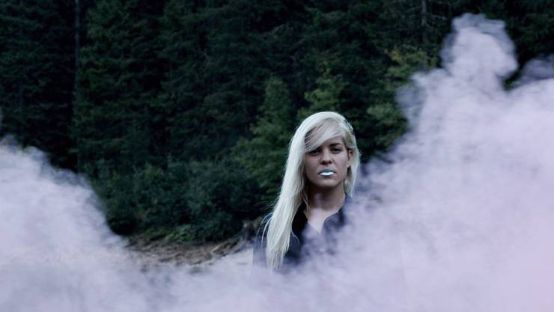
Christine Hasler works as a theater musician and singer/songwriter. She completed her Master's degree in Music and Media Art at the Bern University of the Arts in 2015. As a theater musician, she has worked with Markus Heinzelmann at the Theater Kanton Zürich, the Staatstheater Nürnberg, the Stadttheater Ingolstadt and the Hessisches Landestheater Marburg, with Marie Bues at the Schlachthaustheater in Bern and at the Rampe in Stuttgart. With her singer/songwriting project Lia Sells Fish, she regularly performs concerts throughout Switzerland.
Violinist Simone Meyer is a student of Bartlomiej Niziol, who teaches at Bern University of the Arts. She won a sponsorship prize at the Migros Culture Percentage competition in 2013 and a Rahn scholarship in 2014/15. In 2016, she toured as a soloist with the Junge Münchner Philharmonie under the direction of Mark Mast and performed seven concerts in Munich, Zurich and Vienna.
Letters from Ethel Smyth put online
The Leipzig University of Music and Performing Arts is publishing 57 letters from Smyth's Leipzig student days Ethel Smyth (1858-1944) online.
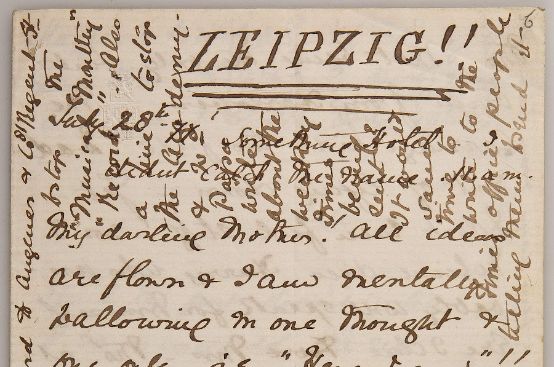
The English composer Ethel Smyth (1858-1944) came to Leipzig in 1877 to study music at the local conservatory. "Leipzig!!! ... HERE I AM", was the title of one of the first of over 50 letters she wrote to her mother during this time. In them, she gives an impressive account of the cultural differences to her home country that are noticeable in everyday life, her training at the Leipzig Conservatory and also of her diverse activities and encounters in Leipzig's social life.
In 2014, the Leipzig University of Music and Theatre (HMT) succeeded in acquiring the 57 letters offered by a London antiquarian bookshop through a sponsorship campaign. The individual documents were then made accessible in the Kalliope manuscript portal. Just in time for the 75th anniversary of the death of the composer, writer and women's rights activist Ethel Smyth, the letters are now also available online.
The digital copies can be found with other objects from the digital HMT collection on the portal Saxony.digital and can be used under the CC-BY-SA 4.0 license. The digitization, presentation and long-term archiving of the collection was made possible by the State Digitization Programme for Science and Culture of the Free State of Saxony, coordinated by the SLUB Dresden.
Lucerne Festival cancels Easter and piano
The Lucerne Festival Easter and Piano Festivals will be discontinued. From 2020, the festival will focus on the summer festival. The focus will be on the Festival Orchestra, the Academy, the Lucerne Festival Alumni and activities for the city and region.
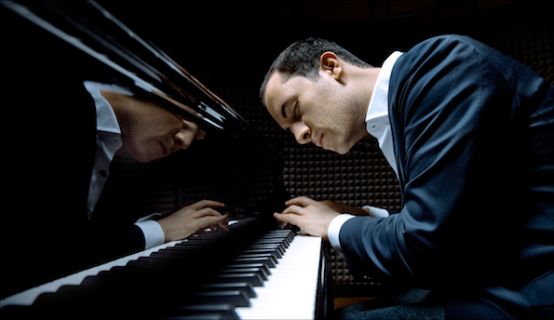
As part of their periodic strategy review, the Lucerne Festival Foundation Board and Executive Board have decided on the new festival structure that will apply from next year. Two new weekends will be created from 2020. These will offer audiences concerts in spring and fall, including in-house productions.
In addition to the orchestra and the Academy, the Lucerne Festival Alumni are to be given more importance. This is a network of former Academy participants whose concert activities in Lucerne and abroad are steadily increasing. Activities in the city and region of Lucerne are also to be intensified. These include, for example, the concert broadcasts on the Inseli, the "In den Strassen" festival, the experience day and the "40min" format.
Swiss Grand Prix Music 2019 goes to Cod.Act
The Swiss Grand Prix Music 2019 goes to Cod.Act - André and Michel Décosterd. The two brothers focus on the interactions between sound, image and space. A further fourteen musicians or ensembles were awarded the Swiss Music Prize.
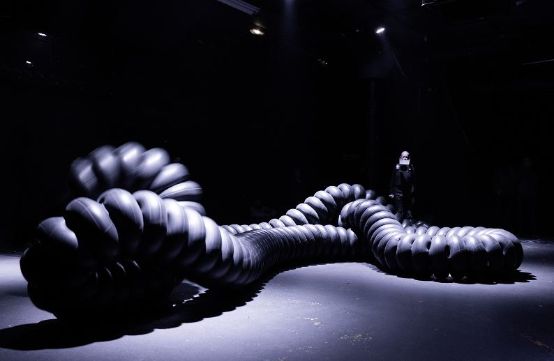
André and Michel Décosterd were born in 1967 and 1969 in Le Locle. André Décosterd, a musician, specialized in music informatics and studied the composition systems of electro-acoustic and contemporary music. Michel Décosterd, an engineer, began designing moving sculptures. Since 1997, the two brothers have combined their talents as Cod.Act, creating musical and architectural forms with an aesthetic reminiscent of the industrial world.
The following 14 musicians or ensembles will be honored with a Swiss Music Prize: Bonaventure - Soraya Lutangu (Rougemont VD), d'incise - Laurent Peter (Geneva), Pierre Favre (Le Locle), Ils Fränzlis da Tschlin (Engadin), Béatrice Graf (Nyon), Michael Jarrell (Geneva), Kammerorchester Basel (Basel), KT Gorique (Sion), Les Reines Prochaines (Basel), Rudolf Lutz (St. Gallen), Björn Meyer (Bern), Andy Scherrer (Brunnadern SG), Sebb Bash (Lausanne) and Marco Zappa (Locarno).
From jazz to contemporary music, from hip-hop to rap and from classical to folk music, all genres of music are represented by the award winners. This year, however, the focus is on electronic music in a wide variety of forms. For the first time, a prize will also be awarded to an orchestra.
Hotel tax to remain
The Committee for Science, Education and Culture of the Council of States (WBK-S) is now in favor of not abolishing the obligation to pay remuneration for private premises of hotels and similar institutions. The creative artists had campaigned for remuneration for receivers in hotels and vacation apartments.
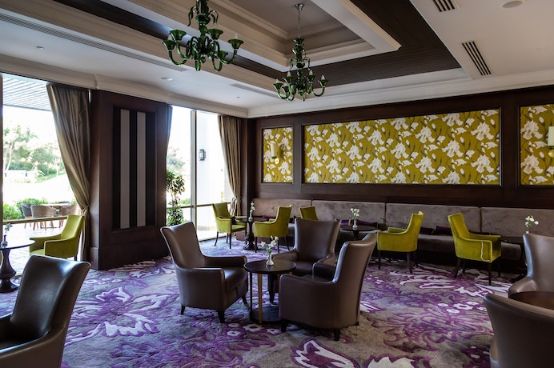
Contrary to the National Council, the Council of States committee wants the hotel tax to remain in place. If the National Council has its way, hotels, hospitals and prisons should no longer have to pay for the use of public works on their premises. The use should be defined as personal use.
However, the Commission has maintained its earlier decision on video-on-demand. It agrees that filmmakers should receive remuneration for video-on-demand use. The regulation is intended to take account of the increasing online use of works and the disappearance of video stores. However, the WBK proposes to exclude music in films from such a remuneration obligation.
The copyright societies had campaigned for its retention. See this Article in the SMZ.
Photo: Ruslan Keba / Unsplash
Concert clothing of the future
What should a fashionable concert outfit look like that is adapted to the special requirements of playing? Contribute your experiences and wishes by May 16!

What do you wear at your concerts? Is it a predetermined professional outfit or can you decide for yourself? Do you like this outfit? Is it practical? What would you change?
A student at the Swiss Textile College has set herself the task of designing fashionable concert clothing adapted to the special requirements of playing. She is very grateful for your experience.
Take part in this Online survey (duration approx. 5 minutes).
The aim of the survey is to find out your needs, but also the difficulties that concert clothing can cause when playing music. Your details will remain anonymous and will not be used outside of this research.
The draft resulting from the survey will be published in the December 2019 issue of the Swiss Music Newspaper presented.
Photo: Kai Pilger on unsplash





